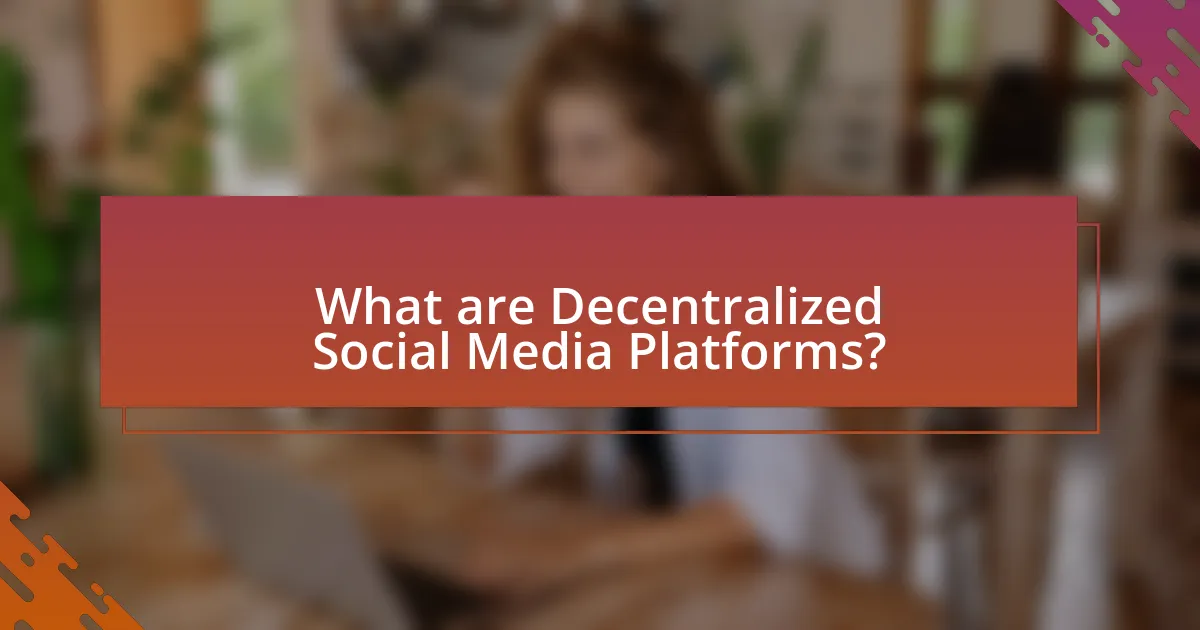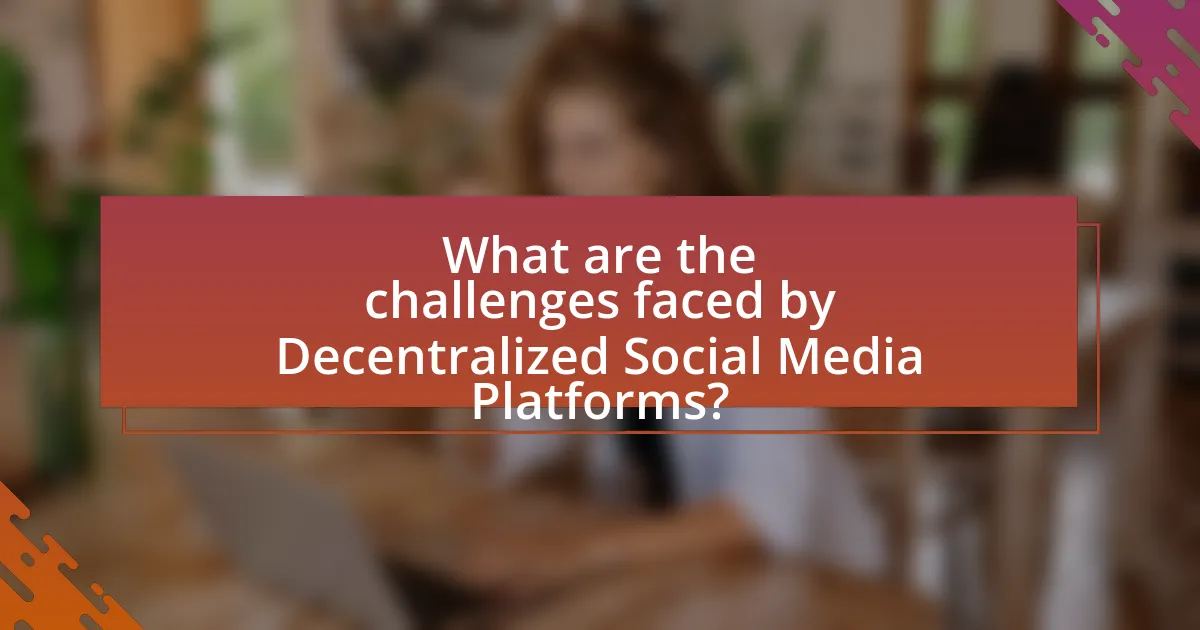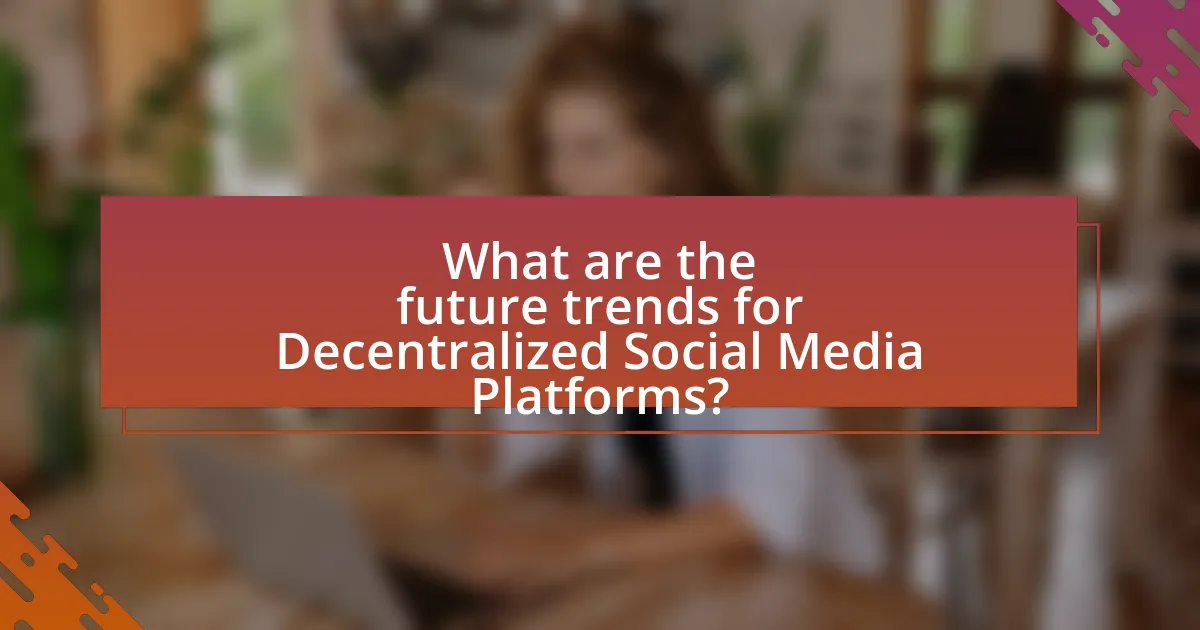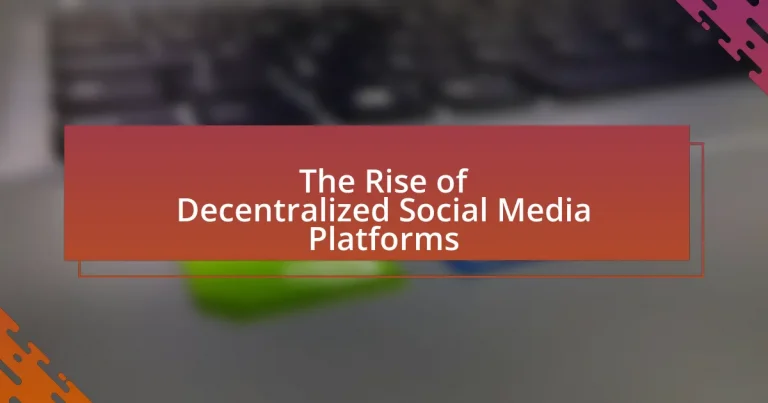Decentralized social media platforms are online networks that operate without a central authority, allowing users to control their own data and interactions. This article explores the key features of these platforms, including user control, data ownership, and censorship resistance, while contrasting them with traditional social media models. It also examines the motivations behind the rise of decentralized platforms, such as privacy concerns and the desire for free expression, as well as the challenges they face, including scalability and regulatory hurdles. Additionally, the article discusses future trends, the influence of blockchain technology, and the importance of community engagement in ensuring the sustainability of decentralized social media ecosystems.

What are Decentralized Social Media Platforms?
Decentralized social media platforms are online networks that operate without a central authority, allowing users to control their own data and interactions. These platforms utilize blockchain technology or peer-to-peer networks to distribute control among users, enhancing privacy and reducing censorship. For instance, platforms like Mastodon and Diaspora enable users to create their own servers, fostering a diverse ecosystem where content moderation is community-driven rather than dictated by a single entity. This model contrasts with traditional social media, where user data is often monetized and controlled by corporations.
How do Decentralized Social Media Platforms differ from traditional platforms?
Decentralized social media platforms differ from traditional platforms primarily in their governance and data control. Traditional platforms, such as Facebook and Twitter, operate on centralized servers controlled by a single entity, which manages user data and content moderation. In contrast, decentralized platforms like Mastodon and Diaspora utilize a network of independent servers, allowing users to retain control over their data and participate in community-driven governance. This structure reduces the risk of censorship and promotes user privacy, as no single organization has overarching authority over the content or user information. Additionally, decentralized platforms often employ blockchain technology to enhance transparency and security, further distinguishing them from their centralized counterparts.
What are the key features of Decentralized Social Media Platforms?
Decentralized social media platforms are characterized by user control, data ownership, and censorship resistance. Users maintain ownership of their data, allowing them to decide how it is shared and used, which contrasts with centralized platforms that often exploit user data for profit. Additionally, these platforms typically operate on blockchain technology or peer-to-peer networks, enhancing security and privacy. Censorship resistance is another key feature, as decentralized platforms are less susceptible to government or corporate interference, allowing for free expression. For instance, platforms like Mastodon and Diaspora exemplify these features by enabling users to create and manage their own nodes, fostering a diverse and independent social media ecosystem.
Why is decentralization important in social media?
Decentralization is important in social media because it enhances user control and privacy while reducing the risk of censorship. By distributing data across multiple nodes rather than relying on a central authority, users can maintain ownership of their content and personal information. This structure mitigates the influence of single entities, which can manipulate or censor information, as evidenced by incidents where centralized platforms have removed content based on their policies. Furthermore, decentralized platforms can foster diverse communities and promote free expression, as users are less likely to face arbitrary restrictions.
What are the main motivations behind the rise of Decentralized Social Media Platforms?
The main motivations behind the rise of decentralized social media platforms include user control over data, enhanced privacy, and resistance to censorship. Users increasingly seek platforms that allow them to own their content and personal information, as evidenced by the growing concerns over data breaches and misuse by centralized entities. Additionally, decentralized platforms offer greater privacy protections, appealing to users wary of surveillance and data tracking. The desire for freedom of expression drives users to these platforms, as they provide a space less susceptible to censorship, which has been a significant issue on traditional social media. The combination of these factors has led to a notable shift towards decentralized alternatives, reflecting a broader demand for autonomy and security in digital interactions.
How do user privacy concerns drive the adoption of decentralized platforms?
User privacy concerns significantly drive the adoption of decentralized platforms by offering users greater control over their personal data. As traditional centralized platforms often collect, store, and monetize user information, individuals increasingly seek alternatives that prioritize privacy and data security. Research indicates that 79% of internet users are concerned about how their data is being used by companies, leading to a growing demand for decentralized solutions that do not rely on a central authority to manage user information. This shift is evidenced by the rise of platforms like Mastodon and Diaspora, which emphasize user autonomy and data ownership, thereby attracting privacy-conscious users.
What role does censorship resistance play in the popularity of these platforms?
Censorship resistance significantly enhances the popularity of decentralized social media platforms by allowing users to freely express their opinions without fear of suppression. This characteristic attracts individuals who value freedom of speech and seek alternatives to traditional platforms that may impose content restrictions. For instance, platforms like Mastodon and Diaspora have gained traction due to their decentralized nature, which empowers users to control their data and content. According to a 2021 study by the Pew Research Center, 64% of social media users expressed concerns about censorship on mainstream platforms, indicating a strong demand for alternatives that prioritize user autonomy and free expression.

What are the challenges faced by Decentralized Social Media Platforms?
Decentralized social media platforms face several challenges, including scalability, user adoption, and content moderation. Scalability issues arise because decentralized networks often struggle to handle large volumes of users and data efficiently, which can lead to slow performance and user dissatisfaction. User adoption is another significant challenge, as many individuals are accustomed to centralized platforms and may be hesitant to switch due to unfamiliarity or perceived complexity. Additionally, content moderation becomes complicated in decentralized environments, where the lack of a central authority can lead to the proliferation of harmful content, making it difficult to enforce community standards. These challenges hinder the growth and effectiveness of decentralized social media platforms.
How do scalability issues affect the growth of decentralized platforms?
Scalability issues significantly hinder the growth of decentralized platforms by limiting their ability to handle increased user demand and transaction volume. When a decentralized platform cannot efficiently scale, it experiences slower transaction times and higher fees, which can deter new users and reduce overall engagement. For instance, Ethereum faced scalability challenges during peak usage periods, leading to transaction fees skyrocketing to over $50 in 2021, which discouraged many users from participating. This directly impacts the platform’s adoption and limits its potential to compete with centralized alternatives that can offer faster and cheaper services.
What technological advancements are needed to improve scalability?
To improve scalability in decentralized social media platforms, advancements in distributed ledger technology (DLT) and peer-to-peer networking are essential. DLT, such as blockchain, enables secure and efficient data management across multiple nodes, allowing for increased transaction throughput and reduced latency. For instance, Ethereum’s transition to a proof-of-stake consensus mechanism aims to enhance scalability by enabling more transactions per second while lowering energy consumption. Additionally, improvements in sharding techniques can further distribute data processing, allowing networks to handle larger user bases without compromising performance. These advancements are critical for supporting the growing demand for decentralized applications and ensuring seamless user experiences.
How do user experience challenges impact platform adoption?
User experience challenges significantly hinder platform adoption by creating barriers that discourage users from engaging with the platform. When users encounter difficulties such as complex navigation, slow loading times, or unclear interfaces, they are more likely to abandon the platform in favor of alternatives that offer a smoother experience. Research indicates that 88% of online consumers are less likely to return to a site after a bad experience, highlighting the critical role of user experience in retaining users. Furthermore, platforms that fail to address user feedback and continuously improve their interfaces may struggle to build a loyal user base, ultimately impacting their growth and sustainability in the competitive landscape of decentralized social media.
What regulatory hurdles do Decentralized Social Media Platforms encounter?
Decentralized social media platforms encounter significant regulatory hurdles primarily due to their non-centralized nature, which complicates compliance with existing laws. These platforms often struggle with issues related to data privacy, as regulations like the General Data Protection Regulation (GDPR) impose strict requirements on data handling and user consent, which can be challenging to implement in a decentralized framework. Additionally, decentralized platforms face difficulties in content moderation, as they lack a central authority to enforce community guidelines, leading to potential conflicts with laws governing hate speech, misinformation, and copyright infringement. Furthermore, regulatory bodies may classify these platforms differently, impacting their obligations under financial regulations, especially if they incorporate cryptocurrency or token-based economies. The lack of clear regulatory frameworks specifically addressing decentralized technologies adds to the uncertainty, making it difficult for these platforms to navigate compliance effectively.
How do different countries approach regulation of decentralized platforms?
Different countries approach the regulation of decentralized platforms through varying frameworks that reflect their legal, cultural, and economic contexts. For instance, the European Union emphasizes comprehensive regulations, such as the Digital Services Act, which aims to hold platforms accountable for harmful content while promoting user rights. In contrast, the United States adopts a more laissez-faire approach, focusing on free speech and innovation, with limited regulatory measures specifically targeting decentralized platforms. Countries like China impose strict controls, banning many decentralized services to maintain state oversight and control over information. These diverse regulatory strategies illustrate how national priorities shape the governance of decentralized platforms, impacting their operation and user engagement globally.
What implications do regulations have on user freedom and platform functionality?
Regulations significantly restrict user freedom and impact platform functionality by imposing compliance requirements that can limit content sharing and user interactions. For instance, regulations such as the General Data Protection Regulation (GDPR) in Europe mandate strict data handling practices, which can lead platforms to restrict user-generated content to avoid legal repercussions. This compliance often results in reduced user autonomy, as platforms may censor or limit access to certain features to adhere to regulatory standards. Additionally, regulations can stifle innovation by creating barriers to entry for new platforms, thereby consolidating power among established entities that can afford compliance costs. The implications of these regulations are evident in the operational constraints they impose, which can lead to a less dynamic and user-centric online environment.

What are the future trends for Decentralized Social Media Platforms?
Future trends for decentralized social media platforms include increased user control over data, enhanced privacy features, and the integration of blockchain technology for transparency and security. As users become more aware of data privacy issues, platforms that prioritize user ownership of content and data are likely to gain traction. Additionally, the rise of decentralized finance (DeFi) may lead to innovative monetization models for content creators, allowing them to earn directly from their audience without intermediaries. According to a report by the World Economic Forum, the adoption of decentralized technologies is expected to grow significantly, with projections indicating that by 2025, over 10% of global GDP could be stored on blockchain networks, highlighting the potential for decentralized social media to reshape online interactions.
How is blockchain technology influencing the development of decentralized platforms?
Blockchain technology is significantly influencing the development of decentralized platforms by providing a secure, transparent, and immutable framework for data management and transactions. This technology enables users to maintain control over their data and interactions without relying on centralized authorities, which is a fundamental principle of decentralized platforms. For instance, platforms like Mastodon and Diaspora utilize blockchain to ensure that user-generated content is stored in a way that prevents censorship and enhances privacy. Additionally, the use of smart contracts on blockchain networks facilitates automated governance and incentivizes user participation, further promoting decentralization. The rise of decentralized finance (DeFi) applications also exemplifies how blockchain fosters innovation in creating peer-to-peer services, thereby reshaping traditional business models.
What are the potential use cases of blockchain in social media?
Blockchain can enhance social media through decentralized content ownership, improved data privacy, and monetization opportunities for creators. Decentralized content ownership allows users to retain control over their data and intellectual property, reducing reliance on centralized platforms. Improved data privacy is achieved by enabling users to manage their personal information securely on the blockchain, minimizing the risk of data breaches. Additionally, blockchain facilitates direct monetization for creators through token-based systems, allowing them to receive compensation without intermediaries. These use cases are supported by the growing trend of decentralized applications (dApps) that leverage blockchain technology to create user-centric social media experiences.
How might user governance models evolve in decentralized platforms?
User governance models in decentralized platforms may evolve towards more democratic and participatory frameworks. As decentralized platforms gain traction, users are likely to demand greater influence over decision-making processes, leading to the implementation of mechanisms such as token-based voting systems and community-led initiatives. For instance, platforms like DAOstack and Aragon have already demonstrated how decentralized autonomous organizations can empower users to propose and vote on governance changes, reflecting a shift from traditional top-down governance to a more egalitarian approach. This evolution is supported by the increasing adoption of blockchain technology, which provides transparent and immutable records of governance actions, thereby enhancing trust among users.
What role do communities play in the success of Decentralized Social Media Platforms?
Communities are essential for the success of decentralized social media platforms as they drive user engagement, content creation, and governance. The active participation of users fosters a sense of ownership and belonging, which is crucial for the sustainability of these platforms. For instance, platforms like Mastodon and Diaspora rely on community-driven moderation and content curation, ensuring that the platform remains relevant and aligned with user interests. Additionally, research indicates that user-generated content significantly enhances platform attractiveness, as seen in the rise of niche communities that cater to specific interests, thereby increasing user retention and platform growth.
How can community engagement enhance platform sustainability?
Community engagement enhances platform sustainability by fostering user loyalty and active participation, which are critical for long-term viability. Engaged communities contribute to content creation, moderation, and platform governance, ensuring that the platform remains relevant and responsive to user needs. For instance, platforms like Reddit and Discord have demonstrated that active user involvement leads to increased retention rates and a vibrant ecosystem, as users feel a sense of ownership and responsibility towards the platform. Research indicates that platforms with high levels of community engagement experience lower churn rates, as users are more likely to remain active participants when they feel connected to the community and its values.
What strategies can be employed to foster active user communities?
To foster active user communities, platforms should implement strategies such as incentivizing user participation, creating engaging content, and facilitating open communication. Incentivizing participation can include rewards for contributions, which has been shown to increase user engagement; for example, platforms like Reddit utilize karma points to encourage quality posts. Creating engaging content involves curating relevant topics and encouraging user-generated content, which can enhance community interaction and retention. Facilitating open communication through forums, feedback channels, and regular updates helps users feel valued and connected, as evidenced by successful communities on platforms like Discord, where real-time interaction fosters a sense of belonging.
What best practices should users follow when engaging with Decentralized Social Media Platforms?
Users engaging with decentralized social media platforms should prioritize privacy, security, and community guidelines. To enhance privacy, users must utilize strong, unique passwords and enable two-factor authentication, which significantly reduces the risk of unauthorized access. Security can be further bolstered by being cautious about sharing personal information and recognizing phishing attempts, as decentralized platforms often lack centralized oversight. Additionally, users should familiarize themselves with the community guidelines of each platform to ensure respectful and constructive interactions, as decentralized environments thrive on user governance and community standards. Following these best practices fosters a safer and more positive experience within decentralized social media ecosystems.




